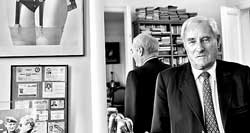
Get out of Afghanistan: France's million-selling spy writerPARIS, (AFP) - France's top-selling spy writer has some trenchant advice for Western forces fighting the Taliban in Afghanistan: get out while you can."The Taliban have perfected a system," says Gerard de Villiers. "They launch an attack from a village, the allies send in the planes, and inevitably there's a big civilian bodycount. Then the Taliban come back for the orphans -- and train them up to be suicide bombers. "I have a huge amount of sympathy, for the British especially. They're fighting in atrocious conditions and they're taking a lot of risks. But let's face it -- it's all going nowhere. Outsiders will never control Afghanistan."Fiction writer he may be, but De Villiers is more qualified than most to pronounce on NATO's dilemma.
His latest book -- like all its predecessors -- is built around a solid core of expert information, gleaned during a field trip to Afghanistan in May and from sources inside French intelligence. The story of two agents posing as aid workers who are seized by Islamists, "Hostage of the Taliban" stars De Villiers' aristocratic Austrian hero, Malko Linge (pronounced 'linger'), an espionage freelance who -- as he always does -- comes to the aid of a beleaguered CIA. "The Americans have one big problem in life -- that they are Americans,"says De Villiers in an interview at his palatial flat overlooking the Arc de. Triomphe in Paris. The walls are decorated with a selection of weaponry and erotic art. "When I was in Afghanistan I had contacts with the Taliban that I could not possibly have had if I had been American. The Americans often have to subcontract their problems out to other services, so what Linge does is not so far fetched."Staggeringly, this is the 171st novel in the S.A.S. series -- so-called after Linge's honorific "Son Altesse Serenissime" (His Most Serene Highness) -- which De Villiers has produced at a rate of four a year since he gave up his career as a foreign correspondent in 1965. Instantly recognisable in their gun-and-girl covers, the books are massively popular in France as well as in Germany, Russia, Turkey and Japan. De Villiers, now 78, claims to have sold an extraordinary 150 million books over his career -- with every year a million more added to the total in France alone. Critical acclaim, however, has not been as forthcoming. For France's literary establishment, De Villiers -- who has marked right-wing views -- is a non-person, and many bookshops refuse to stock his output. Stations and airports are the main sales points. Not even De Villiers' enemies deny that his information is second to none, and each book in the series is built around a real-life world crisis. This year began with "Polonium" -- on the Litvinenko murder in London -- followed by "The Defector of Pyongyang" -- which centred on the money-laundering activities of Kim Jong Il. The next will focus on Kosovo, where De Villiers, who has just been there, predicts an imminent explosion."The outside powers made two contradictory promises -- to the Albanian Kosovars that there would be independence, and to the Serbs that there would not. And now we are on collision course," he said. Before starting a book, De Villiers travels to the country involved and taps into his network of contacts in the armed forces and intelligence community. In Kosovo, for example, he was guest of the newly-appointed French commander of NATO's KFOR force General Xavier Bout de Marnhac. His researches on "Polonium" in London convinced De Villiers that the Russian FSB -- heir to the Communist KGB -- was behind the 2006 radiation murder of the dissident Alexander Litvinenko. "One thing that was never published is that MI5 have identified the man who brought the polonium into Britain -- and it wasn't (number one suspect Andrei) Lugovoi. It was a man who came to Britain on a Latvian passport, stayed in the country with another passport, and left with a Slovak one. "Altogether there were 25 people involved. That kind of operation can only be mounted by a major intelligence outfit," he said. De Villiers describes himself as a mixture between British spy writer John Le Carre and the American Robert Ludlum, and he regrets that his phenomenal international success has never carried over into the English-speaking world. "I bear the curse of being French. Between the French and English-speaking worlds there are walls of steel. The truth is you just don't read foreign books," he said. |
|| Front
Page | News | Editorial | Columns | Sports | Plus | Financial
Times | International | Mirror | TV
Times | Funday
Times || |
| |
Reproduction of articles permitted when used without any alterations to contents and the source. |
© Copyright
2007 | Wijeya
Newspapers Ltd.Colombo. Sri Lanka. All Rights Reserved. |
